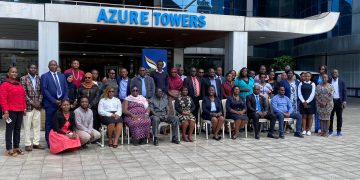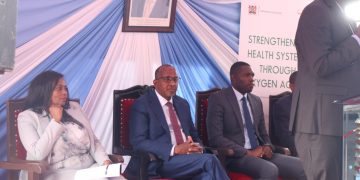By Mike Mwaniki
The 100 Cuban specialists who arrived in Kenya are expected to improve and strengthen the country’s primary health care services as the
Speaking to Health Business Magazine, Director of Medical Services, Dr. Jackson Kioko said a majority of the Cuban doctors, 53 are family physicians, whoare expected to arrive in the country, from July.
“As we embrace and advance the UHC Agenda, our focus will be mainly in ascertaining the state of the (Nation’s) health through PHC as we move away from curative services.
““The Cuban specialists, will therefore, play a critical role in not only assisting our Health sector in strengthening our current status of PHC and community development, but also in re-designing our systems,” Dr. Kioko added. President Uhuru Kenya has identified UHC as among his government’s key pillar of his “Big 4 Agenda” which include affordable Healthcare, affordable Housing, food and manufacturing.
Dr. Kioko, who was speaking in his Ministry of Health Afya House headquarters office in Nairobi, reiterated that the Cuban doctors were specialists in fields that Kenya either “lacked (in our public health facilities) or faced a serious shortage”. Apart from the 53 Family Physicians—a breakdown of the other Cuban specialists include nine Critical care physicians, three Cardiologists, five Orthopaedic Surgeons, three Plastic Reconstructive Surgeons and five Nephrologists.
There are also three Urologists, one Neurosurgeon and two Endocrinologists of whom the first batch, will arrive in July. “Currently, the few Kenyan specialists that we possess are based in private hospitals and are therefore not willing to work in hard to reach areas…
“Our surgeons are unwilling to be deployed in counties such as Isiolo, Marsabit, Wajir, Mandera or Turkana. We cannot deny communities living in those areas such critical services. This is an issue of equity,” the DMS asserted. Patriotism among our surgeons and other specialists, Dr. Kioko noted, was lacking and this “gap” needed to be urgently addressed as communities needing their services continued to “suffer in silence”.
“In Kenya, for example, the few Endocrinologists and Neonatologists we have work in the private sector and there is none in public health facilities countrywide,” Dr. Kioko added. Dr. Kioko said the emphasis on PHC was also in line with the country’s Vision 2030.
“After serving for two years, the Cuban specialists will have assisted in enhancing Kenya’s capacity in the provision of PHC services as well as in mentoring as many doctors as possible in the sub-specialis,” he said. In Kenya, the DMS said, the health sector plans to focus more on preventive and community participation.
Experts have warned that Kenya is currently experiencing an epidemiological transition in its disease burden from infectious to Non-communicable diseases (NCDs) resulting in a double burden of disease. The NCDshave been termed as a major public health concernwith significant social and economic implications in terms of health-care needs; lost productivity and premature death. The Kenya STEPwise Survey for NCDs Risk Factors (2015) report says NCDs account for more than 50 per cent of total hospital admissions and over 55 per cent of hospital deaths in Kenya.
“However, up to 80 per cent of premature deaths from heart disease, stroke and diabetes, for example, can be averted with evidence-based behavioural and pharmaceutical interventions,” the report asserts. The World Health Organisation (WHO) estimates that NCDs will cause 73 per cent of global deaths and 60 per cent of the burden of disease by 2020. According to Dr. Kioko, the Cuban Family Physicians’ will be deployed to














